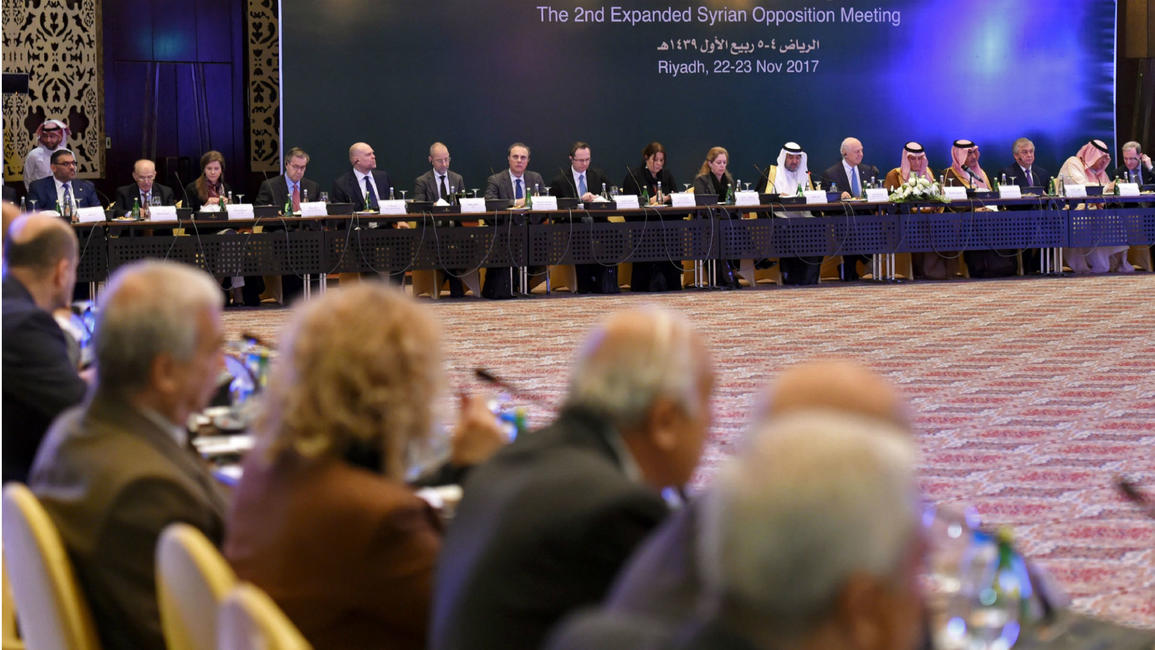Syrian opposition forms 23-member delegation for Geneva talks with regime
Syria’s opposition formed its negotiations team for next week's UN-brokered peace talks with the Syrian regime in Geneva, sources told The New Arab on Monday.
The High Negotiations Committee will consist of “23 members, headed by Nasr al-Hariri” sources said.
It comes after al-Hariri was announced as chief negotiator following the resignation of former head Riyad al-Hijab, who quit shortly before the opposition conference in Riyadh.
Among the delegates listed to take part in the upcoming talks is spokesman Yahya al-Aridi, as well as members, Khaled Mahameed, Jamal Suleiman, Hanadi Abu Arab, Hadi al-Bahra, Abdel-Ahad Astefou, Hawas Khalil, Safwan Akash, Alees MAfraj, Ahmed al-Asrawi, Firas al-Khalidi, Muneer Darwish, Qasem al-Khatib, Ammar al-Nahas, Mohammed al-Dihni , Ahmed al-Awda, Yasser Abdulraheem, Basma Qadhmani, Tariq al-Kurdi, Mohaned Diqan, Sami Bitanjana and Yousif Salman.
In addition to delegates from the Syrian National Coalition, it includes representatives from the Cairo and Moscow-based platforms.
These have been accused of collaborating with Russia and the Syrian regime, with a campaign by activists this week aimed at excluding the groups from the HNC.
Syria's opposition have been under pressure from Saudi Arabia and other powers to "unify their ranks" and to weaken their demands - such as the departure of Bashar al-Assad - following a series of regime advances.
In addition, Russia's leading role in peace efforts and reluctance from the US and Gulf to continue supporting the opposition has given the regime a stronger hand in negotiations.
Despite this, new chief Hariri says he hopes the regime will also accommodate opposition demands to end the war.
"We expect the other side (Syrian regime) to come to the negotiations so that we can all move forward in the political process," Hariri said.
Several rounds of talks hosted by the United Nations have failed to bring an end to the Syrian conflict.
This weakness has seen the UN-sponsored Geneva talks lose its significance while the rival Russian-Turkish-Iranian peace efforts have been seen as more forceful.
These talks have led to the creation of "de-escalation" zones, despite Moscow and Damascus routinely breaking these local ceasefires.
More than half a million have been killed and millions forced from their homes since Bashar al-Assad's forces brutally suppressed anti-regime protests in 2011, leading to an armed rebellion.
Assad's fate has been a major stumbling block in multiple rounds of negotiations between the Syrian regime and the opposition.


![Minnesota Tim Walz is working to court Muslim voters. [Getty]](/sites/default/files/styles/image_684x385/public/2169747529.jpeg?h=a5f2f23a&itok=b63Wif2V)




![Debris near Rafic Hariri International Airport [Getty]](/sites/default/files/styles/image_330x185/public/2176162423.jpeg?h=a5f2f23a&itok=MCSK9mkM)
![An Israeli air strike on Jabalia killed teenage journalist Hassan Hamad [Screengrab/X]](/sites/default/files/styles/image_330x185/public/2024-10/hassan%20hamad1.jpg?h=c12e0b96&itok=Rd_dyCVp)
